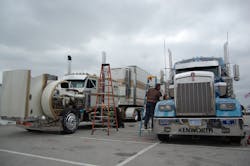Despite having more than a year’s worth of experience with the Federal Motor Carrier Safety Administration’s (FMCSA) Compliance, Safety, Accountability (CSA) program, fleets are still adjusting to life under a more intense regulatory microscope. And if there is one area that is taking the brunt of that focus, it’s vehicle maintenance.
Under CSA’s seven BASICS (Behavior Analysis and Safety Improvement Categories), vehicle-related defects remain at the top of the violations list.
“It all comes down to having drivers who do a good pre-trip [inspection] and fixing problems as soon as they happen. Something you don’t fix today will only get worse tomorrow,” says Lance Craig, CEO of Craig Transportation, Perrysburg, OH.
Driver training and new and renewed focus on maintenance practices are helping fleets minimize issues that crop up during roadside inspections. At U.S. Xpress Enterprises, drivers are now trained not to take a vehicle out on the road and risk a violation if they spot a problem during a pre-trip inspection. That training focus also encourages drivers to pay particular attention to brakes, tires and lights – the “big three” on FMCSA’s vehicle violation list. The company has also increased trailer inspections from once a year to two to three times a year, says Max Fuller, chairman & CEO.
“CSA will definitely have an impact on maintenance operations,” says Charles Arsenault, founder & chairman of Arsenault Associates. “While drivers are the primary focus of CSA, there are some 275 maintenance items included in the regulation, and drivers really can’t do much about 202 of those, even though they will be held responsible for them. As a result, we are seeing some pushback from drivers. Going forward, I expect to see auditors doing things like interviewing technicians.”
Foley Carrier Services, a company that specializes in Dept. of Transportation compliance, recommends fleets require drivers to not only conduct daily pre-trip and post-trip inspections, but to also complete their driver vehicle inspection report (DVIR) every day.
Annette Sandberg, a former administrator for FMCSA and now managing partner of TransSafe Consulting, offers advice for any fleet struggling to comply with the maintenance requirements of CSA. Sandberg urges fleets to reduce their risk of intervention by establishing tighter controls on DVIRs, periodic maintenance, and annual inspections.
“Vehicle maintenance is one of the toughest areas to track,” she says. “Many drivers consider DVIRs a nuisance, and many companies do not have adequate controls to monitor pre- and post-trip inspections,” she says. “Follow-through on deficiencies noted in DVIRs is often weak or nonexistent as well. It is critical that carriers have a robust system to monitor all required vehicle maintenance items.”
And for some fleets, that system comes in the form of maintenance software.
Maintenance management systems can monitor inventory, repair orders, parts ordering, vehicle histories, warranty management, and invoicing. They are also particularly helpful when it comes to preventive maintenance reminders. Many fleets, though, still do not use the systems and if they do, oftentimes do not realize their full potential, Arsenault says.
“We do a lot of research,” he explains, “and according to our studies, almost 40% of fleets still have no maintenance software system at all. Some of those who do report using a system say they use things like Excel or even Word [to manage maintenance].
“What software does is get you organized and keep you that way,” Arsenault notes. “It can provide fleet maintenance managers with detailed cost information and operational histories in a format that makes it possible to achieve more real-time control of their fleet.”
As part of its efforts to reduce violations, Schneider National has altered its tire maintenance program. More frequent checks of trailer tires as well as removing tires at higher tread depths; replacing trailer tires with self-sealing models; and enhancing access to nationwide “tire banks” to ensure faster tire replacement times are among the steps Schneider has taken.
“Tire maintenance is just as critical as it’s always been, just as safety has always been first and foremost in our minds,” says Steve Graham, vice president of purchasing. “So we were doing the right things prior to CSA and will continue to do them.”
Other fleets are having success with the installation of tire pressure monitoring systems that ensure proper tire inflation at all times, which help keep the prying eyes of inspectors off of their vehicles.
In the end, all experts agree, it is diligence, persistence, and attention to detail that will ultimately reduce the number of violations any fleet receives.
Maintenance scores can be very tough to improve, according to Sandberg, because carriers with poor CSA scores are more apt to be targeted for repeat inspections and because “any trooper worth their salt can find a maintenance violation if they try.”
But by following strict maintenance procedures and following through when issues arise, those violations can be minimized.
